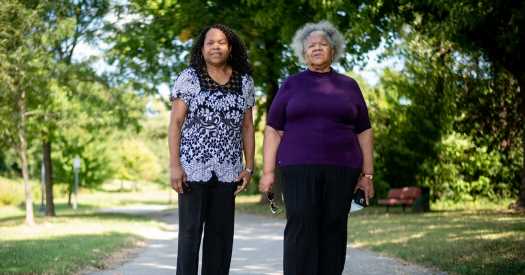Studies Begin to Untangle Obesity’s Role in Covid-19

People with extra weight may struggle to mount a robust immune response to the coronavirus — and may respond poorly to a vaccine.
By Katherine J. Wu
In early April, Edna McCloud woke up to find her hands tied to her hospital bed.
She had spent the past four days on a ventilator in a hospital in St. Louis County, Mo., thrashing and kicking under sedation as she battled a severe case of Covid-19.
“They told me, ‘You were a real fighter down there,’” recalled Ms. McCloud, a 68-year-old African-American retiree with a history of diabetes and heart problems. She weighed close to 300 pounds when she caught the coronavirus, which ravaged her lungs and kidneys. Nearly six months later, she feels proud to have pulled through the worst. “They said people with the conditions I have, normally, this goes the other way,” she said.
As rates of obesity continue to climb in the United States, its role in Covid-19 is a thorny scientific question. A flurry of recent studies has shown that people with extra weight are more susceptible than others to severe bouts of disease. And experiments in animals and human cells have demonstrated how excess fat can disrupt the immune system.
But the relationship between obesity and Covid-19 is complex, and many mysteries remain. Excess weight tends to go hand in hand with other medical conditions, like high blood pressure and diabetes, which may by themselves make it harder to fight Covid-19. Obesity also disproportionately affects people who identify as Black or Latino — groups at much higher risk than others of contracting and dying from Covid-19, in large part because of exposure at their workplaces, limited access to medical care and other inequities tied to systemic racism. And people with extra weight must grapple with persistent stigma about their appearance and health, even from doctors, further imperiling their prognosis.
“A new pandemic is now laying itself on top of an ongoing epidemic,” said Dr. Christy Richardson, an endocrinologist at SSM Health in Missouri. Regarding obesity’s effects on infectious disease, she said, “We are still learning, but it’s not difficult to understand how the body can become overwhelmed.”
The correlations between Covid-19 and obesity are worrisome. In one report published last month, researchers found that people with obesity who caught the coronavirus were more than twice as likely to end up in the hospital and nearly 50 percent more likely to die of Covid-19. Another study, which has not yet been peer-reviewed, showed that among nearly 17,000 hospitalized Covid-19 patients in the United States, more than 77 percent had excess weight or obesity.
Similar links were unmasked during the H1N1 flu pandemic of 2009, when researchers began to notice that infected people with obesity were more likely to wind up in the hospital and to die. Flu vaccines administered in subsequent years performed poorly in individuals with extra weight, who fell ill more often than their peers even after getting their shots.
“Obesity resets human physiology,” said Dr. Anne Dixon, a pulmonologist at the University of Vermont Medical Center who studies how excess weight can affect respiratory conditions like asthma. “People who are very obese are living on sort of a precarious position. This is not just cosmetic.”
Experts said part of obesity’s threat is mechanical: Large amounts of fat, for instance, can compress the lower parts of the lungs, making it harder for them to expand when people breathe in. The blood of people with obesity also seems to be more prone to clotting, plugging up delicate vessels throughout the body and starving tissues of oxygen.
Fat, or adipose tissue, can also send out hormones and other signals that make nearby cells go haywire. “Adipose tissue is very active,” said Rebekah Honce, a virologist at St. Jude Children’s Research Hospital in Tennessee and an author on a recent review describing how metabolism intersects with immunity. “It’s not a dormant tissue.”
Source: Read Full Article

